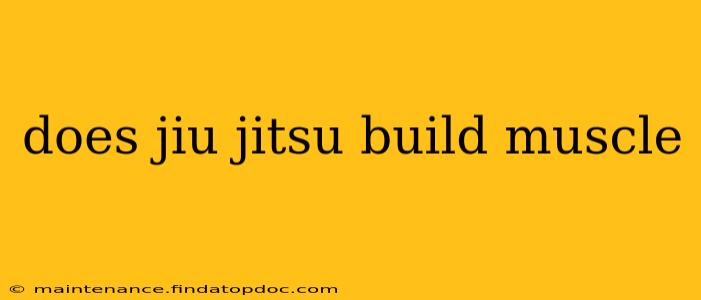Brazilian Jiu-Jitsu (BJJ) is a grappling martial art known for its effectiveness in close-quarters combat. But beyond its self-defense applications, many wonder: does BJJ actually build muscle? The answer is a resounding, nuanced yes. While it might not pack on muscle mass like dedicated weightlifting, BJJ contributes significantly to muscle development, strength, and endurance in unique ways.
What Types of Muscles Does Jiu Jitsu Build?
BJJ training engages a wide array of muscle groups, focusing on functional strength rather than isolated hypertrophy (muscle growth for aesthetic purposes). You'll see significant development in:
- Core Muscles: Maintaining proper posture, executing takedowns, and resisting submissions requires a rock-solid core. Expect significant strengthening of your rectus abdominis, obliques, and transverse abdominis.
- Back Muscles: Pulling guards, escaping submissions, and controlling your opponent necessitates strong back muscles, including your latissimus dorsi, trapezius, and erector spinae.
- Legs and Glutes: From takedowns to controlling your opponent's position, your legs and glutes are constantly engaged. You'll develop powerful quads, hamstrings, calves, and glutes.
- Upper Body: Gripping, pulling, and controlling your opponent's limbs works your biceps, triceps, shoulders, and forearms. While not necessarily leading to massive gains in size, you'll see noticeable increases in strength and definition.
How Does Jiu Jitsu Differ From Weightlifting for Muscle Growth?
While both BJJ and weightlifting build muscle, they do so through different mechanisms:
- Weightlifting: Typically focuses on isolating muscle groups to maximize hypertrophy through high repetitions with controlled weight. This leads to significant increases in muscle size.
- BJJ: Employs compound movements that work multiple muscle groups simultaneously. The focus is on functional strength and endurance, leading to more lean muscle mass and improved overall fitness. Muscle growth is a byproduct of the intense physical demands of the sport.
Think of it this way: weightlifting is like sculpting a statue; BJJ is like forging a weapon. Both require strength, but their purposes and methods differ.
Does Jiu Jitsu Build Muscle as Much as Weightlifting?
No, BJJ won't build muscle as quickly or dramatically as dedicated weightlifting routines. Weightlifting, particularly with proper nutrition and rest, is specifically designed for muscle hypertrophy. BJJ, while building muscle, prioritizes functional strength, endurance, and technical skill. However, many BJJ practitioners develop impressive physiques over time.
Will I Get Bigger Muscles Doing Jiu Jitsu?
Whether you get "bigger" muscles depends on your starting point, genetics, training intensity, and diet. You'll likely see an increase in muscle definition and strength, but the significant bulk associated with weight training might not occur. Your body composition will likely shift towards a leaner, more athletic physique.
Can I Build Muscle Doing Jiu Jitsu Alone?
While BJJ builds significant muscle, it’s beneficial to incorporate supplementary exercises to maximize muscle growth. Some practitioners supplement their BJJ training with weight training, calisthenics, or other forms of strength and conditioning to target specific muscle groups more effectively. This approach allows you to benefit from the functional strength and endurance of BJJ while also promoting more targeted muscle growth.
What's the Best Way to Build Muscle With Jiu Jitsu?
To optimize muscle growth while training BJJ:
- Focus on proper technique: Efficient technique minimizes wasted energy and maximizes muscle engagement.
- Train consistently: Regular training is crucial for stimulating muscle growth.
- Prioritize nutrition: Consume a balanced diet with sufficient protein to support muscle repair and growth.
- Get adequate rest: Rest allows your muscles to recover and rebuild.
- Consider supplementary training: Adding weightlifting or calisthenics can help target specific muscle groups.
In conclusion, Jiu-Jitsu is a fantastic way to build functional strength, improve overall fitness, and develop a lean, athletic physique. While it might not match the muscle growth potential of dedicated weightlifting, it offers a unique blend of strength, endurance, and self-defense skills that are hard to match. By combining consistent training, proper nutrition, and potentially supplementary exercises, you can maximize your muscle development within the context of your BJJ journey.
